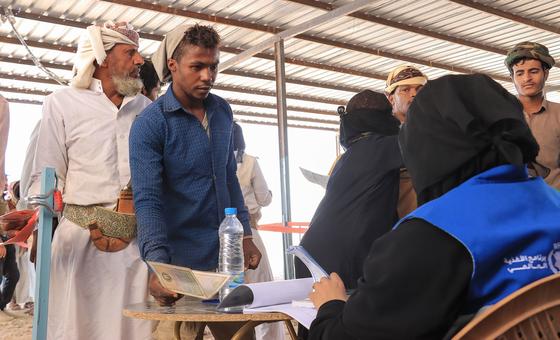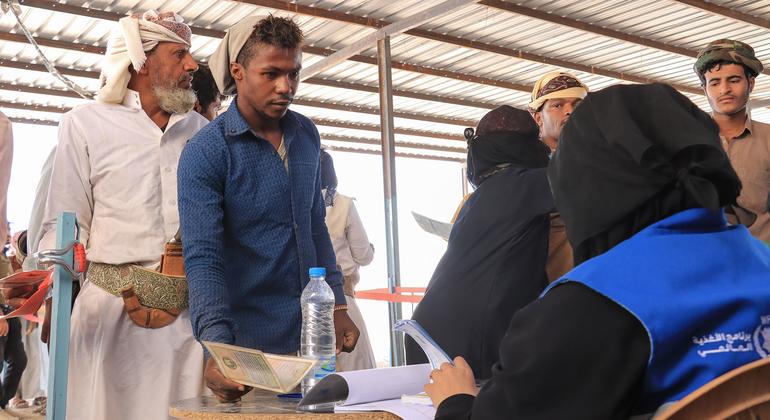
The region has been under the control of opposition Houthi forces since the internationally recognized Government were driven out of the city in 2015.
WFP said that despite negotiating with the authorities for nearly a year to provide a more limited aid programme that would reach around 6.5 million in need, versus the current 9.5 million, no agreement has been reached.
The scaled down programme would match available resources to the neediest families, said WFP, adding that ending distribution for now, was a “difficult decision” that had been reached in consultation with donors.
Food stocks in areas under the Sana’a Based Authorities’ control “are now almost completely depleted and resuming food assistance, even with an immediate agreement”, could take up to four months due to supply chain disruptions, the agency added.
Continuing while stocks last
WFP said it would continue its programmes to limit the impact of the pause, “for as long as the agency has sufficient funding” and cooperation from the Houthi authorities.
In areas of Yemen under Government control, food distribution will continue with a heightened focus on the most vulnerable, the agency added, aligning with adjustments to aid amidst the budget crunch announced last August.
Similar prioritization is taking place in nearly half of WFP’s operations around the world as the agency navigates the challenging landscape that the entire humanitarian sector is facing.
WFP said its top priority is the well-being of those affected, and the agency will continue to work towards a breakthrough in talks with the authorities.
Giving human rights a sporting chance
The Sporting Chance Forum got underway in Geneva on Tuesday bringing together key players on and off the pitch from across the sporting world to discuss the future of sport and human rights, and make pledges that will help shape the coming decades in this important field.
SCF23 is officially part of the UN’s Human Rights 75 initiative, which celebrates the 75th anniversary of the Universal Declaration of Human Rights (UDHR).
The two-day event is being hosted by the International Labour Organization (ILO) and human rights office OHCHR.
UN rights chief Volker Türk, said improving equality on the sports field would help catalyze social transformation overall.
He also raised strong concern over racism, racial discrimination, and xenophobia in sport.
Athletes, family members, and fans from minority communities, all face frequent abuse, which is able to thrive in a culture of near impunity, he warned.
He highlighted the case of Brazilian football player, Vinícius Júnior, who has faced hateful racist slurs in recent month on the pitch of legendary football club Real Madrid, highlighting what he said was a grim reality that is often minimized by industry insiders.
Gender inequality and discrimination against women and LGBTIQ+ people “also remain widespread”, Mr. Türk warned.
Emergency Response Fund tapped to aid Myanmar civilians
The UN’s Humanitarian Affairs chief, Martin Griffiths, has allocated $7 million from the Central Emergency Response Fund (CERF) to help civilians displaced by the fighting in Myanmar.
A brutal military takeover in February 2021 sparked a major protest movement across the country, fuelling armed insurgencies amid widespread human rights abuses by forces loyal to the junta.
Fighting escalated in Myanmar in late October, expanding from northern Shan state to Rakhine state, as well as the northwest and southeast of the country, UN Spokesperson Stéphane Dujarric told journalists in New York.
“More than half a million people have been newly internally displaced by this violence. This is in addition to the two million men, women and children who were already displaced in Myanmar”, he said.
Despite insecurity, access and telecommunication challenges, essential humanitarian assistance is being provided where possible, he added.
Local and international humanitarian partners remain committed to staying and delivering, having reached at least 2.5 million people in Myanmar through the end of September.
However, the UN’s $887 million Humanitarian Response Plan for year is less than a third funded to the tune of around $254 million.
“Additional support is urgently needed to enable humanitarians to respond effectively and at scale to the escalating needs”, Mr. Dujarric said. The CERF contribution will help humanitarian organizations get life-saving assistance to people whose lives have been uprooted by the intensifying conflict.



